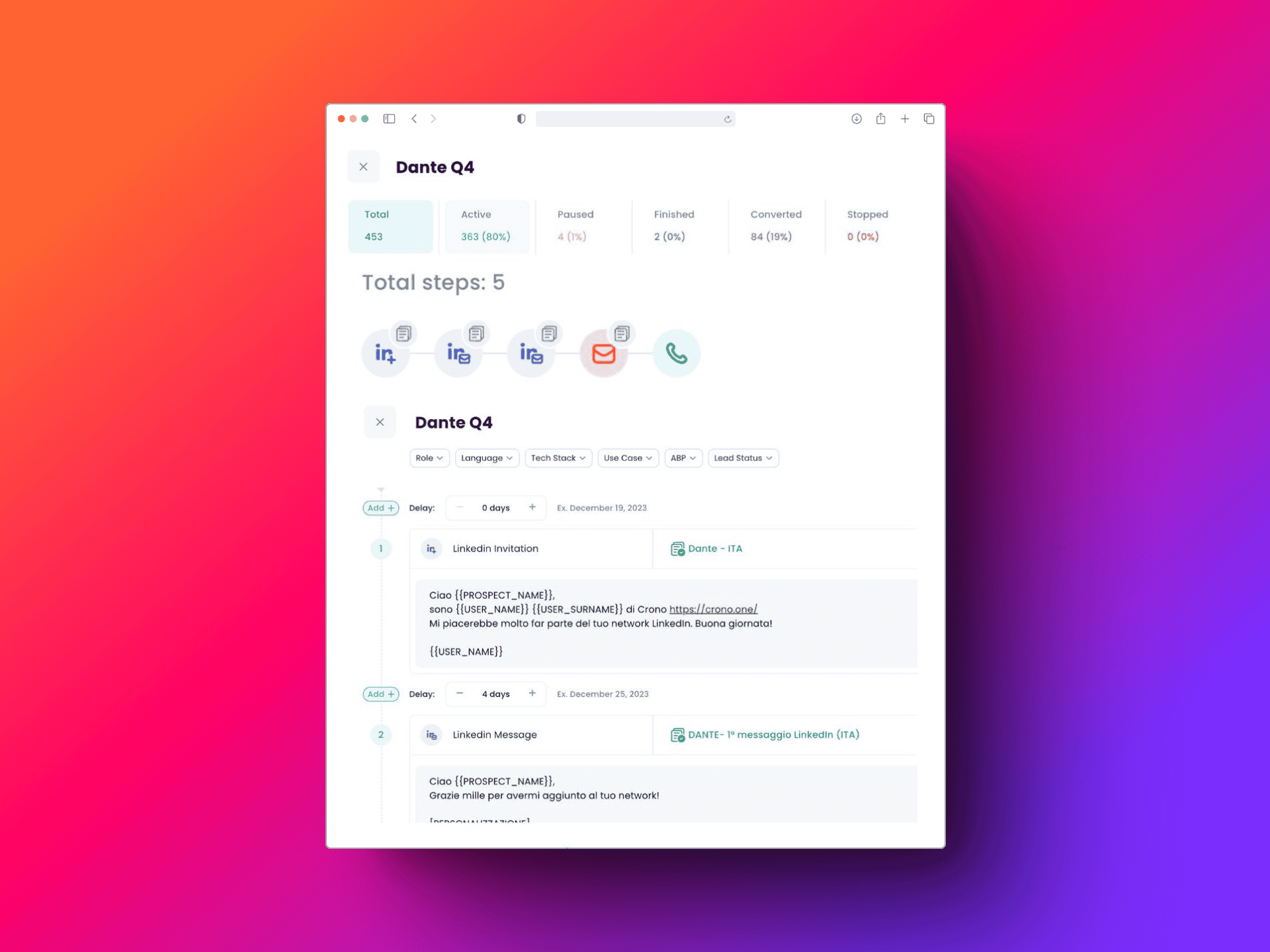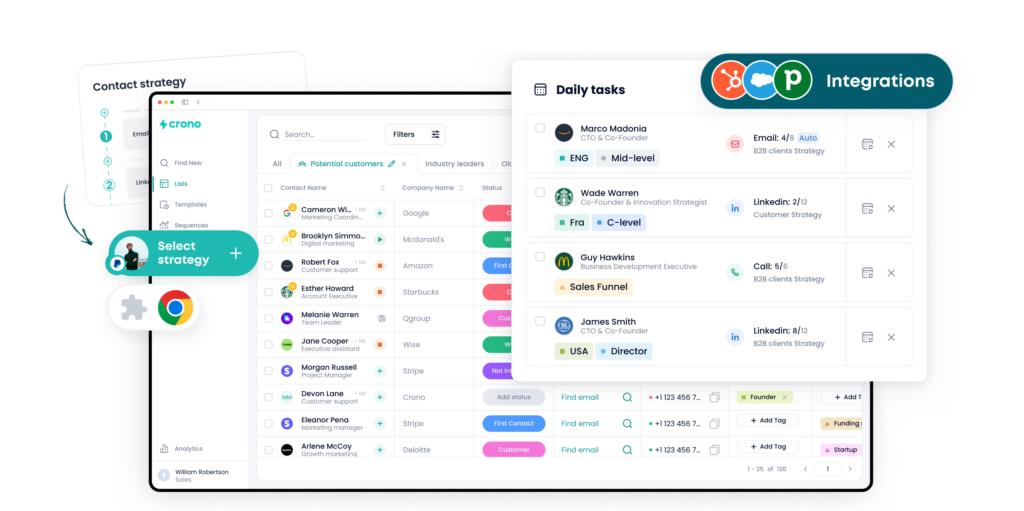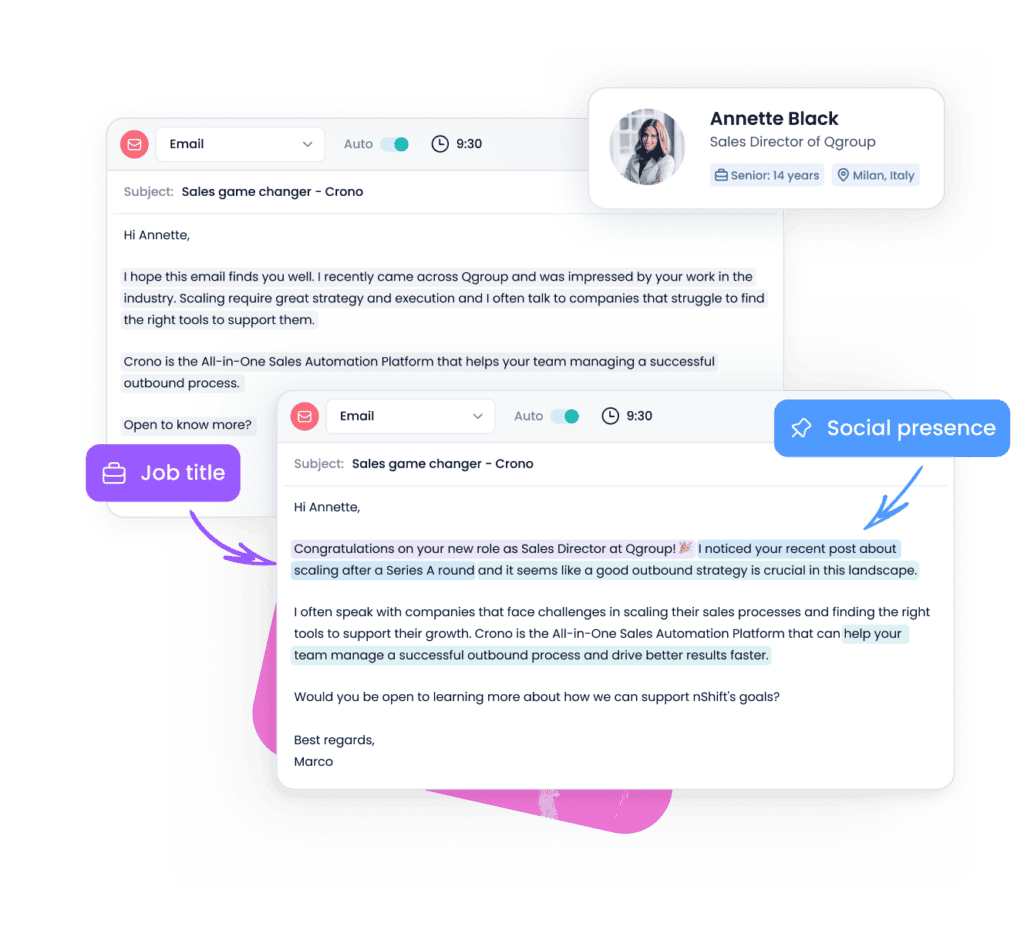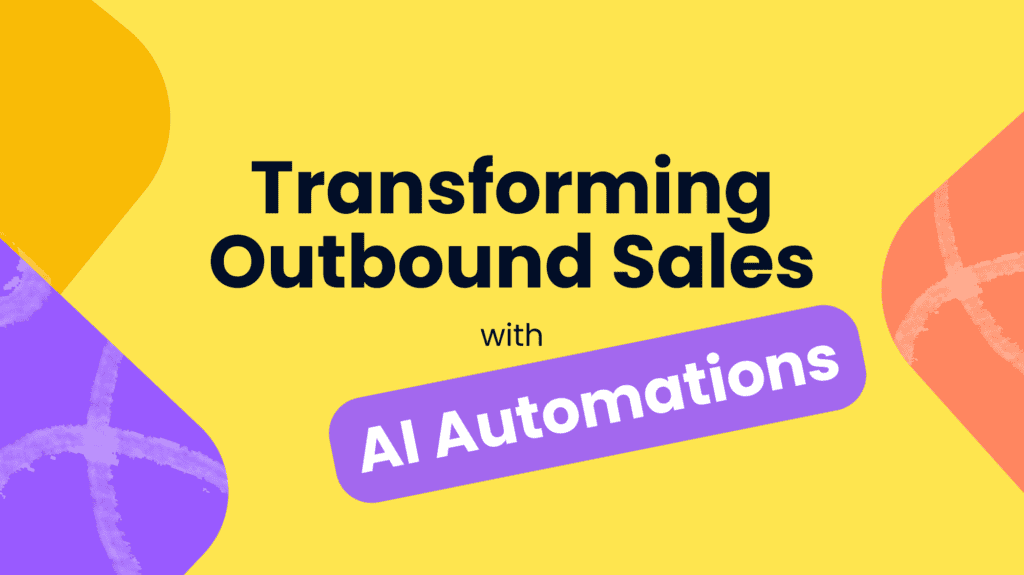How to improve Sales Engagement with AI-driven Automation
Sales is all about connecting with the right people, at the right time, with the right message. Each phone call, email, and action between the Sales reps and the Prospects represents a critical touchpoint – a chance to build relationships, spark interest, and drive conversions.
Each touchpoint is a chance to engage the prospect in a conversation and build a relationship that could lead to a deal.
Yet in today’s fast-paced market, relying solely on manual outreach simply isn’t enough to drive engagement rate from prospects. With an ever-growing volume of prospects and heightened buyer expectations, the traditional approach to sales is evolving. Modern sales engagement now hinges on leveraging smart, AI-driven automation to not only streamline processes but also deliver hyper-personalized interactions at scale.
In this post, we’ll delve into what sales engagement truly means, explore its key components, and uncover how AI-powered automation sales engagement tools are redefining the landscape of outbound sales.
Overview of Sales Engagement
What is Sales Engagement?
Sales engagement is the strategic process of interacting with prospects across multiple channels—such as calls, emails, social media, and more—to build meaningful relationships with each prospect.
It refers to all the interactions and conversations made between the salesperson and the prospects, across every touchpoint in the sales cycle, from initial outreach to closing deals. In simple words, whenever a salesperson makes contact with a prospect or customer, it’s considered a sales engagement activity.
Some of the most common forms of sales engagement include:
- In-person contact: Whether it’s a formal meeting, a coffee chat, or a networking event/trade show, in-person interactions always allow for a deeper, more personal connection.
- Direct contact: Making cold calls, sending emails, and direct messaging via SMS or social media channels like LinkedIn, Twitter, and Telegram that engage customers in a direct conversation immediately.
- Social Media Engagement: Using social media channels that create content and engage leads with comments and likes.
- Video Conferencing: Virtual meetings or demos via platforms such as Zoom or Microsoft Teams that allow face-to-face interactions.
- Web-based Engagement: When the customers make contact with your website, either fill in a contact form or chat with the live chat/chatbot function that is available on the website.
Today, most sales engagement activities happen online, as it allows for reaching a higher number of customers without the constraints of geography.
Why is Sales Engagement so important?
By transforming interactions into meaningful relationships, sales engagement can drive business growth. When your sales team connects effectively with customers, they’re not just making a sale, they’re laying the groundwork for long-term success.
Here are some compelling benefits of effective sales engagement campaigns:
Shorter Sales Cycle: By engaging with customers, the sales reps gain insights into the customers, their pain points, needs, preferences, and possible solutions that resonate with their needs. This can shorten the sales cycle by 30–33%.
Higher Conversion Rate: A personalized engagement outreach, tailored specifically to a prospect’s industry, pain points, and interests can resonate on a much deeper level with the prospects. This approach can boost lead conversion rates by 15–20%.
Improved Customer Retention: Sales engagement helps you connect with customers in a more meaningful and timely way. This leads to strong relationships, repeat business, positive referrals, and continuous growth. By building trust and meaningful relationships, companies have seen a 5–10% increase in customer retention, turning one-time buyers into repeat customers.
That’s the big picture for business, but for an SDR, what are the immediate benefits?
In a world where sales are getting more and more difficult, where prospects are tired of being bombarded with cold emails and calls interrupting their day, a good engagement strategy that truly resonates with the prospect’s pain point, showing you can give actual value, will definitely stand out and prompt people to reply.
Sales engagement best practices
To truly drive sales, it’s essential to refine your engagement strategies with the best sales engagement practices that not only connect but also convert, focusing on:
1. Personalisation
In today’s competitive landscape, when people receive cold calls and cold emails on a daily basis, generic messaging just doesn’t cut it. If you start with a call script saying what you are selling, believe me, they will hang up after saying no. People just don’t care who you are.
A personalised approach that starts with some humor and some relevant information about the leads works differently.
Instead of telling Sarah your company provides the best sales tool in the market, tell her:
“Hey, congratulations on your promotions / Saw you hiring new SDRs / Saw your post about sales efficiency, we help companies like [Similar Company] to streamline sales process / make it easier to ramp up new Reps / increase efficiency. Mind if I share more?”
Of course, personalization takes time and is hard to scale, but imagine if you could personalize every message sent out to hundreds of leads with a single click, wouldn’t that change the game?
Crono’s “Rewrite with AI” is able to do mass personalization and rewrite thousands of messages/emails sent out to hundreds of prospects at a single click, giving you:
- Relevant messages tailored to the info YOU choose;
- REAL personalization, not just spin syntax;
- Full rewrite of all your messages for all leads, in one click;
- Full automation, but you still have control over the whole process.
2. Multichannel Approach
Effective sales engagement means meeting prospects where they are. Whether through email, LinkedIn, phone calls, or social media, a multichannel approach ensures you meet your prospects at various touchpoints.
Only 8% of outreach emails receive a response (that means the other 92% are ignored), while the average connecting rate of calls is only 16% (not all of this 16% will buy from you though). Being present everywhere, at all times gives you a better chance of success.
That said, being everywhere is not enough if your messages are inconsistent. This is where sales engagement tools come in.
They unify all channels under 1 umbrella, and help you track actions and conversations you make with the prospects at all touchpoints, ensuring you are engaging with the prospects correctly.
3. Automation
Automation is key to managing large volumes of outreach without sacrificing quality. By automating repetitive tasks, like scheduling follow-ups, lead generation, and data entry, sales teams can focus on high-impact activities.
Moreover, automation brings consistency to your outreach efforts. It ensures that every prospect is engaged according to a set schedule, reducing the risk of leads slipping through the cracks.
With automated workflows, you can maintain a steady cadence of communications, even when dealing with thousands of prospects.

Integrating AI with automation takes this a step further.
Crono’s AI analyzes past interactions and prospect behaviors, telling you if the lead fits with your ICP, strategizing the timing and content of your messages, and making every outreach not just consistent, but also highly personalized.
4. Social Selling
Unlike the traditional method, social selling focuses on building relationships and credibility through compelling content and active engagement on social media and community platforms. By establishing a strong online presence on platforms like LinkedIn, Reddit, or RevGenius, you position yourself as an industry expert who shares valuable insights.
Over time, prospects start seeing you as a trusted advisor rather than just another salesperson, and proactively searching and engaging with you.
In addition, with Crono’s help to extract lead, this can become a high-quality lead generation source.

The Challenges of Traditional Sales Engagement Methods
Sales engagement practices have been around for decades, evolving slowly from the old-school days of direct sales and telemarketing.
Back then, cold calling and field sales were the name of the game – picture Jim and Dwight hustling to every company to sell paper in “The Office.”

It was all about picking up the phone, pounding the pavement, and charming prospects in person, with plenty of awkward humor along the way.
Cold calling with standardised scripts, sending mass emails without personalization, and conducting in-person networking events, are all the familiar practices of the old days, without much help from technology, data, and automation tools.
While these traditional sales engagement practices once served as the backbone of sales outreach, they’ve become obsolete today, posing challenges and hindering productivity:
- Manual outreach leads to time wasted: When outreach is done manually, it often results in longer research on leads and more time spent crafting messages. Some people try saving time with one-size-fits-all messaging, but that often fails to resonate with individual prospects, leading to lower engagement rates.
- Disconnected tools create inefficiencies: many sales teams rely on a complex set of tools that don’t communicate with each other. One to help you generate leads, another one to find contact data, and of course you need one for CRM, and then another tool that helps you send emails and messages or schedule your calls. This results in a lack of cohesive strategy, ultimately slowing down the sales process.
- Scalability Issues: Managing hundreds or thousands of leads manually is not only time-consuming but also prone to errors, and frankly – just not possible. Without automation, it becomes nearly impossible to keep track of every lead’s status, follow up promptly, and engage each lead effectively.
The Role of Automation and AI in Enhancing Sales Engagement
With the help of automation and AI in the modern sales world, all of the challenges above can be easily overcome.
With automation, sales teams no longer have to spend large amounts of time on manual, repetitive tasks such as data entry, follow-up scheduling, and updating CRM systems. Your reps can now focus on what’s really driving revenue – talking to the prospects.
For example, automated workflows can trigger follow-up emails or reminders based on prospect interactions, ensuring that no lead slips through the cracks. Not only does it boost productivity, but also helps maintain a consistent outreach process.
In the meantime, AI can take mass personalization to the next level. By analyzing vast amounts of data to understand each prospect’s unique behavior, preferences, and needs, it can craft the most compelling messages that resonate deeply with individual prospects.
When Automation and AI go together? That’s when magic happens.
Together, they create a powerful sales engagement strategy. Automated systems ensure that every prospect receives timely, consistent engagement interactions, while AI tailors each interaction to make it as relevant as possible.
To effectively sell with the best engagement practices, choosing the right tool is necessary.
A good sales engagement platform will allow the team to effectively plan, execute, and optimize sales engagement strategies, increasing demos and driving revenue. Additionally, good sales engagement tools incorporate automation and AI that personalize and streamline repetitive tasks, helping reps focus on revenue-generating tasks.
Sales engagement platforms
The sales engagement platform is designed to boost the entire sales team’s engagement strategies and increase reply rate. SDRs use it every single day to engage with prospects, AEs use it to follow up with leads, and managers use it to track daily sales activities of the teams.
Reports show that top sales engagement platforms have 60%+ daily active users.
The main function of these platforms is to help you efficiently plan, execute, track, measure, and optimize interactions between sales and customers across multiple channels. On the platform, you can pre-design a path to interact effectively with prospects, across email, phone, social media, and other channels, and get instant results and gratification (eg. email open rate, LinkedIn message reply, etc.).
More importantly, from the recorded activities, conversations, open rate, reply rate, etc. the platform lets you know who is the top performers, which sequence works better, and which strategy can be implemented to successfully move the leads down the funnel.
Benefit of Sales engagement platform
There are many benefits to using a Sales engagement platform, let’s break down each element of it:
Single interface: Instead of hopping between different channels, tools, and CRMs with disconnected workflow and information, the sales engagement platform allows sales reps to manage all interaction points with a single interface: sending emails, replying to LinkedIn messages, or managing social media activities.
Efficient workflow: A good sales engagement platform connects and integrates all the CRM, tools, platforms, and channels necessary for your work, thus enabling you a straightforward and efficient workflow. In addition, sales engagement platforms that automate repetitive tasks like CRM logs or data entry free up more time for the reps for actual selling activities.
Easy planning and executing: Easy to plan an effective multi-channel outreach sequence with templates, time settings, and channels that you can execute manually or automatically with the platform systems. For example, the platform can send automatically an outreach sequence (with pre-draft emails and LinkedIn messages) that was crafted 10 days ago to 100 leads in your cadence.
Tracking and measuring: Record and measure all activities and performance of outreach activities (numbers of dials, emails, voicemails) and the template that works, providing insights for managers to manage the team and make decisions.
Get Started with Crono, the sales all-in-one platform
Crono’s AI-driven automation sales engagement platform gives you all the above benefits and more. It streamlines your entire sales process, ensuring you reach every prospect with the right message, at the right time.
Here’s how Crono elevates your sales efforts:
Seamless Integration for unified sales system

Powerful Personalization with AI
With just a few clicks, the AI system can personalize messages across hundreds—or even thousands—of leads based on insights about the lead and the account, ensuring the quality of your engagement strategy.
There are two powerful ways to harness this feature:
Individual Personalization: For a tailored approach, simply click into the insight dashboard for a specific lead and select “Rewrite with AI.” The system then generates personalized messages/emails crafted to address that lead’s unique interests and needs.
Bulk Personalization: Alternatively, add hundreds of leads into one sequence and select key information such as their social posts, company roles, or key interests. With a click on “Rewrite Strategy,” the AI automatically personalizes all messages in the sequence, ensuring that each outreach is uniquely tailored.
This dual approach means you can efficiently scale your outreach without sacrificing the quality and relevance of your messages, ensuring the quality of your engagement strategy.
Scalability & Automation
As your team grows and lead volumes increase, Crono scales seamlessly with you. Automate repetitive tasks, from sending messages to data entry, so you can focus on what matters most: closing deals.
With our newly developed AI system, scaling your sales engagement becomes smarter than ever. Instead of relying on static data, Crono’s AI dynamically analyzes vast amounts of messaging insights to provide tailored responses based on your specific needs.
Through the Edit AI Field feature, users can customize what the AI should analyze – whether it’s determining if a prospect operates in B2B or B2C, identifying key pain points, or even predicting their level of interest in your product. But it doesn’t stop there. The AI adapts to any query you define, meaning you can train it to extract, analyze, and generate insights based on custom fields relevant to your sales process.
This advanced capability ensures that your outreach is always precise, relevant, and scalable—allowing your sales team to prioritize high-value prospects while automating the intelligence-gathering process.
With Crono, AI isn’t just assisting your sales team—it’s working as an extension of it.

Comprehensive Measurement & Reporting
With real-time analytics and detailed reporting, Crono gives you complete visibility into your sales engagement performance. Track open rates, response times, and call connect rates to fine-tune your strategy for maximum impact.
Getting started with Crono means transforming your sales engagement strategy into a well-oiled, high-performing machine. Explore our platform today to experience how smart, integrated engagement can accelerate your sales growth and drive lasting results.
Ready to take your sales engagement to the next level?
Schedule a demo and discover the Crono advantage!
